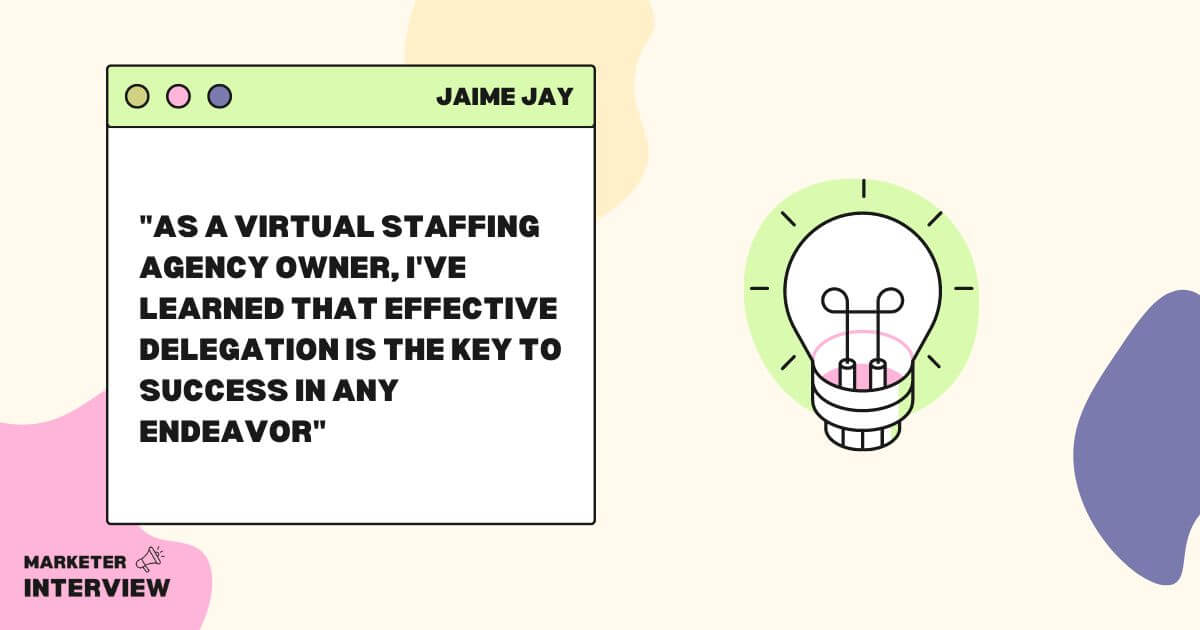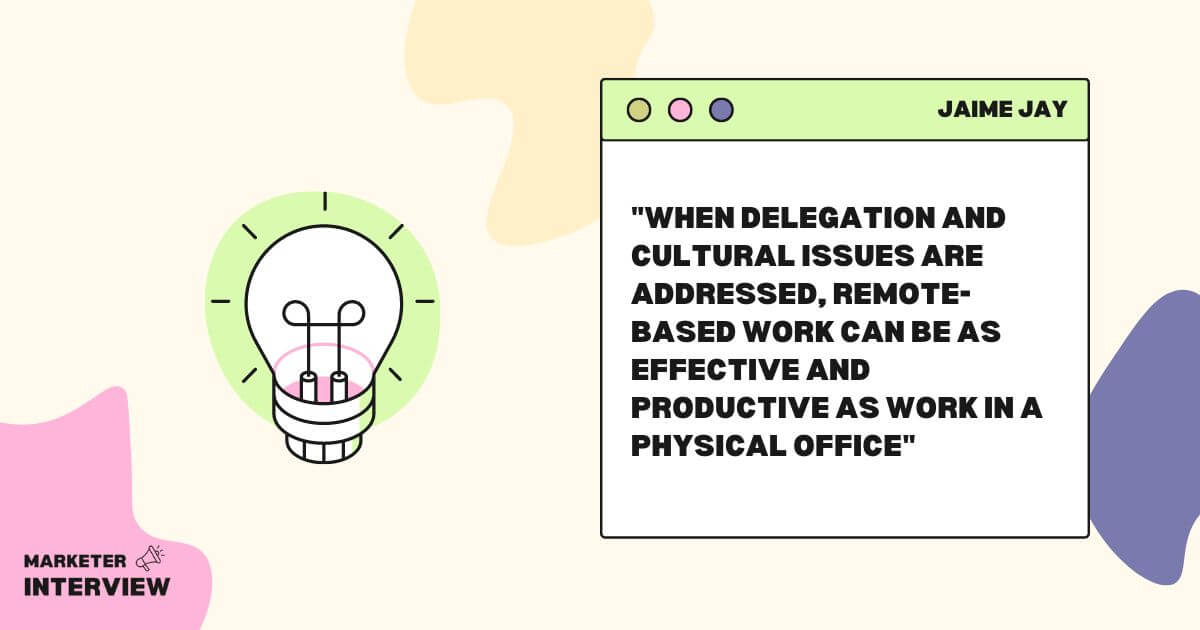From Overwhelm to Efficiency: Delegation and Scalability with Jaime Jay
Welcome to Marketer Interview, where we dive deep into the minds of influential marketers who have made a significant impact in their fields.
In today’s interview, we had the pleasure of speaking with Jaime Jay, a seasoned entrepreneur and the Founder of Bottleneck Distant Assistants.
Jaime is a firm believer in the power of delegation and scalability, and he is passionate about helping business leaders optimize their time and focus on their core strengths.
With a wealth of experience and knowledge to share, Jaime’s insights on remote-based dedicated distant assistants and building sustainable business models will be invaluable.
Contents
- 1 Can you share with us how you first got started in marketing?
- 2 As the Founder of Bottleneck Distant Assistants, could you elaborate on your mission and how you assist overwhelmed business leaders?
- 3 Delegation plays a crucial role in achieving scalability. What are your top tips for business owners or managers who delegate tasks effectively?
- 4 Could you explain the concept of remote-based dedicated distant assistants and how they can benefit businesses?
- 5 Your book, “Quit Repeating Yourself,” discusses the intersections of culture, leadership, systems, processes, recruiting, and hiring. How do these elements contribute to building a sustainable business model?
- 6 What are some common challenges or misconceptions business leaders face when delegating tasks or working with remote teams?
- 7 Can you share a success story where implementing delegation strategies led to significant growth and positive outcomes for a business?
- 8 How do you ensure effective communication and collaboration between business leaders and their remote-based assistants?
- 9 In your experience, what essential qualities or skills should business leaders look for when hiring remote-based dedicated distant assistants?
- 10 Are there any specific tools or software that you find essential for your work in delegation and scalability?
I traded in my military fatigues for a sharp suit and landed a job at a massive corporation where my friend was already killing it in marketing.
I worked in corporate America, honing my skills until 2006 when I began my entrepreneurial career in marketing. My first company was an SEO agency, and then I decided to start building websites. Now I run a remote-based staffing agency.
As the Founder of Bottleneck Distant Assistants, could you elaborate on your mission and how you assist overwhelmed business leaders?
Our mission is to support our clients by leveraging our dedicated distant assistants who enable them to realize their full potential, focus on their best work and build deep personal relationships with real human beings.
We are the world’s first dedicated Distant Assistant company. Our candidates complete the Bottleneck Academy, where they learn how to build intimate relationships with our clients to solidify their relationships with our clients. Hence, they stay longer and are more insightful and productive. They are more apt to align with our client’s core values.
Delegation plays a crucial role in achieving scalability. What are your top tips for business owners or managers who delegate tasks effectively?
As a virtual staffing agency owner, I’ve learned that effective delegation is the key to success in any endeavor.
Whether running a business or just trying to get things done, knowing how to delegate tasks is essential for achieving the scalability you need to reach your goals.
Here are my top tips for mastering the art of delegation:
1. Know your team: The first step in effective delegation is knowing your team’s strengths and weaknesses. This will help you assign tasks to the right people and ensure everyone works to their fullest potential.
2. Set clear expectations: When delegating tasks, set clear expectations for what you want to be done and when you want it done. This will help avoid confusion and ensure everyone is on the same page.
3. Trust your team: Delegation can be terrifying, mainly if you’re used to doing everything yourself. But it’s essential to trust in your team’s abilities and give them the space they need to succeed.
4. Check in regularly: While giving your team space to work is important, it’s also essential to check in regularly and ensure everything is on track. This will help catch any issues early on and keep everyone accountable.
5. Celebrate success: Finally, celebrate your team’s successes! Delegation is all about working together to achieve a common goal and taking the time to recognize your team’s hard work and accomplishments will go a long way in building morale and motivating everyone to keep pushing forward.
Delegation is an art form that takes practice to master. But with these tips in mind, you’ll be well on your way to achieving the scalability you need to succeed in whatever you do.

Could you explain the concept of remote-based dedicated distant assistants and how they can benefit businesses?
I’d be happy to!
Remote-based dedicated distant assistants (virtual assistants) work remotely to provide administrative, creative, technical, or social assistance to businesses.
They can be located anywhere in the world and support businesses of all sizes. The primary benefit of remote assistants is that they allow businesses to delegate tasks to trained professionals who work off-site without the costs of having on-site employees.
One of the key benefits of a remote-based dedicated distant assistant is that they can save businesses a considerable amount of money. Companies that hire virtual assistants don’t need to invest in office space, equipment, and other overhead costs from having full-time staff. By outsourcing work to virtual assistants, businesses can reduce costs while still getting the work done.
Another benefit of a remote-based dedicated distant assistant is that they can help improve business productivity. By delegating tasks to a professional who is specifically trained in handling administrative and technical tasks, businesses can free up their own time to focus on higher-level tasks. By outsourcing tasks to virtual assistants, businesses can decrease the workload for on-site staff, giving them more time to focus on essential tasks.
Remote-based dedicated distant assistants can provide a wide range of services to businesses, from answering emails and managing social media to website management and online research. They can take care of back-end administrative tasks, allowing businesses to concentrate on their core competencies.
Lastly, a remote-based dedicated distant assistant is highly flexible, making it easy to scale up or down as business needs change. Instead of hiring and training new employees, businesses can increase or decrease the workload of virtual assistants as needed, making it a much more cost-effective solution.
Remote-based dedicated distant assistants can help businesses save money, improve productivity, and provide a wide range of services to help businesses grow and thrive. By outsourcing administrative work to remote professionals, businesses can free up time and resources to focus on higher-level tasks and achieve their goals.
Your book, “Quit Repeating Yourself,” discusses the intersections of culture, leadership, systems, processes, recruiting, and hiring. How do these elements contribute to building a sustainable business model?
These elements work together to create a strong foundation for a business and ensure its long-term success.
Culture is one of the most critical aspects of building a sustainable business model. A positive company culture promotes engagement, productivity, and retention. It is the foundation on which everything else is built, and it should reflect the values and goals of the company.
Effective leadership is equally essential. Leaders should be able to set a vision for the company, inspire employees, and manage change effectively. They are responsible for creating an environment where innovation and creativity can thrive, and employees feel valued and supported.
Systems and processes help ensure efficiency and consistency in business operations. They help to streamline workflows and prevent errors, making it easier for employees to complete tasks quickly and accurately.
Well-designed systems and processes also make it easier to delegate tasks and responsibilities to the right people, freeing up time and resources.
Recruiting and hiring are also crucial elements of building a sustainable business model. Companies need to attract and retain top talent to stay competitive.
By hiring the right people, businesses can build a team best suited to achieve their goals. Hiring people who fit the company’s culture and can contribute to its success is crucial to building a sustainable business model.
Culture, leadership, systems, processes, recruiting, and hiring create a sustainable business model.
When done right, they provide a strong foundation for success, helping businesses weather challenges and maintain long-term growth. By investing in these essential elements, companies can build a culture of innovation and productivity that can drive success for years.
What are some common challenges or misconceptions business leaders face when delegating tasks or working with remote teams?
Here are some of the most common challenges and misconceptions that business leaders face:
1. Lack of Control: One of the most common misconceptions is that remote work is hard to control. The idea of not being able to monitor employees and ensure they are working full-time can create anxiety and mistrust of remote collaboration.
2. Communication: Communication can also become an issue when working with remote teams. When team members are in different physical spaces, miscommunications can quickly arise, leaving people uncomfortable or unsure of what to do next.
3. Technology: Technological issues are another challenge of remote work. It can be challenging to create an infrastructure that can securely support the work and communication of a remote team.
4. Misunderstandings: Additionally, remote teams may have to overcome cultural, language, or time zone differences, leading to misunderstandings and confusion.
5. Trust: Trust may be an issue when working with remote workers. Managers may have trouble trusting that these individuals are putting in the required effort and hours towards their work.
The good news is that these challenges can be mitigated with proper planning and communication strategies.
When delegation and cultural issues are addressed, remote-based work can be as effective and productive as work in a physical office. Effective communication methods and the use of digital communication and collaboration tools can significantly aid in the management of remote work.
Creating a culture that supports flexible work options also helps employees feel valued and motivated. Combined with the benefits of remote-based work, these strategies can help businesses overcome challenges and make remote work successful.

Sure, I’d be happy to share a success story!
One of my clients is a coaching company that guides leaders who want to perform better.
For years, the business had seen steady growth, but the owner, Priya, needed help to keep up with the business’s demands. She was involved in every aspect of the business, from management to customer service, which overwhelmed her. Priya knew something had to change, but she wasn’t sure what to do.
After hiring a distant assistant, Priya realized she could benefit from delegating some of her responsibilities to her assistant.
The assistant created a delegation plan that considered Priya’s limitations and the strengths of her team members. Priya started delegating administrative tasks to her team while her management and customer service duties were handed off to other team members. This allowed Priya to concentrate on more strategic aspects of her business.
Soon, Priya noticed a considerable improvement in productivity and overall business growth. She was able to focus her efforts on product development, sales, and marketing, which led to new service offerings and partnerships with other businesses that supported the growth of her community.
Additionally, by delegating the administrative tasks, Priya had more time to develop strategic partnerships and focus on scaling the business.
Priya is now providing more growth and opportunities for her team members. She is satisfied with her team’s ability to take over daily tasks that he once felt were critical but has allowed him to put his company to the next level.
She feels much more relaxed and in control of her business, and her productivity and job satisfaction have improved considerably.
This story illustrates how effective delegation strategies can allow small businesses to scale and succeed tremendously. By delegating tasks, businesses can free up their time to focus on the most critical areas of the operation.
Furthermore, delegating tasks can help team members feel more invested in the company and help them develop their skills. Delegation is critical to creating a productive and sustainable business model, and Priya’s experience highlights its importance.
How do you ensure effective communication and collaboration between business leaders and their remote-based assistants?
Here are some tips that can help ensure effectiveness in these areas:
1. Set clear expectations:
It’s essential to communicate expectations right from the start. Business leaders should set expectations around communication and project management, including preferred modes of communication and response times for emails, calls, and messages.
2. Choose the proper communication channels:
Choosing the proper communication channels is also vital. Some forms of communication, like email or messaging platforms, may be more suitable for quick updates or task assignments. In contrast, others, such as video conferencing software, may better fit detailed discussions and planning.
3. Schedule regular check-ins:
Regular check-ins are essential to keep everyone on track. Schedule weekly or bi-monthly video conferences to discuss progress on specific projects, share updates and get feedback.
4. Use collaboration tools:
Remote collaboration tools such as project management software like Basecamp, Go High Level, and Slack can help remote team members stay organized while facilitating close interaction between team members.
5. Be open and transparent:
Business leaders should be open and honest in communicating with remote-based assistants and vice versa. Regular communication must be free from any level of ambiguity.
When effective communication and collaboration strategies are implemented, remote work can be as effective as working with team members in a physical office.
By building a solid working relationship, remote-based assistants and business leaders can work together to achieve critical business goals.
In your experience, what essential qualities or skills should business leaders look for when hiring remote-based dedicated distant assistants?
Here are some qualities and skills that are particularly important:
1. Strong communication skills: When working remotely, your virtual assistant must have excellent written and verbal communication skills. They should also be proficient in virtual communication tools like email, messaging apps, and video conferencing software.
2. Time management and organization: Time management and organizational skills are crucial for any remote-based worker. Look for someone who can manage their time well, prioritize tasks, and keep everything organized to meet deadlines.
3. Self-motivation: Remote-based assistants must be self-motivated, able to work independently, take the initiative when prompted, and establish and maintain working boundaries with virtual and physical office environments.
4. Technological skills: Remote-based assistants must be comfortable using technology and performing tasks such as managing software tools like Trello, Microsoft Office packages, Google Suite, etc.
5. Adaptability: Remote working environments are typically fast-paced, and things can change quickly. Look for team members who are comfortable adapting to change and thrive under pressure.
6. Attention to detail: Attention to detail is another critical quality in a remote-based dedicated assistant. Small mistakes can become more significant when remote workers are in different physical locations, so hiring someone with a keen eye for detail is essential.
These are essential qualities and skills to look for when hiring a remote-based dedicated distant assistant. Finding the right match is critical, and interviewing is essential in identifying the best candidates for the job.
Are there any specific tools or software that you find essential for your work in delegation and scalability?
Certainly! Here are some alternatives to the tools I mentioned earlier:
1. Go High Level: Go High Level is a customer relationship management (CRM) tool for small businesses. With Go High Level, businesses can manage leads and customers easily, automate emails and SMS, schedule appointments, and share files with clients.
2. Basecamp: Basecamp is a project management tool designed to help teams manage projects and collaboration. It allows you to create to-do lists, share files, and communicate with your team using real-time group chats.
3. ChatGPT: ChatGPT is an artificial intelligence-powered writing assistant tool that can help with tasks such as proofreading, suggesting synonyms, and providing writing prompts. ChatGPT can be helpful for businesses looking to improve the quality of their writing without expending too much effort or time.
These tools can help businesses improve their delegation and scalability by making it easier for teams to communicate and collaborate, manage customer relationships, and improve their writing.
Ultimately, the effectiveness of the tools used will depend on the business’s individual needs, which is why it’s essential to research and test different tools before committing to any single solution.






